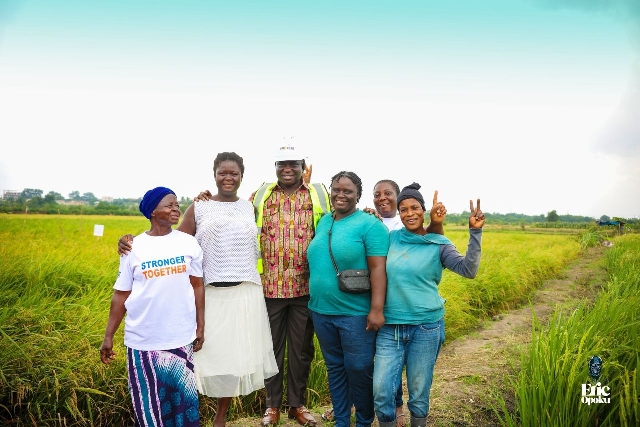Agric Minister launches major irrigation rehabilitation project at Ashaiman
 Mr Eric Opoku with some of thr farmers after th launch in Ashiaman
Mr Eric Opoku with some of thr farmers after th launch in Ashiaman
The Minister for Food and Agriculture, Eric Opoku, has officially broken ground for the rehabilitation of Irrigation Schemes and Improvement of Irrigation Water Management Project at Ashaiman in the Greater Accra Region, marking a significant step in Ghana’s agricultural modernisation agenda.
Speaking at the ceremony on Friday, Mr Opoku underscored the urgent need to restore and upgrade existing irrigation infrastructure to boost local food production and enhance national food security.
“While we are focused on developing new irrigation systems, we must also prioritize the rehabilitation of old ones,” he said.
The Ashaiman project, he noted, is the first in a nationwide rollout that will soon cover Aveyime, Weta, Via, and regions including the Northern, Ashanti, Bono, and Ahafo.
The Minister expressed appreciation to the Government of Korea for its sustained support to Ghana’s agricultural transformation.
Korean institutions such as the Korea Programme on International Agriculture (KOPIA), Korea Rural Community Corporation (KRC), and the Korea Institute for Advancement of Technology (KIAT) have contributed in areas such as farmer training, seed production, and irrigation development.
Notably, a solar farm is also being constructed to lower energy costs for irrigation.
Mr. Opoku revealed that over 100 hectares of land have been dedicated to rice seed production, with an annual target of 10,000 tons by the time the Dawhenya irrigation facility is completed in 2027.
To complement this, a one-megawatt solar power system is being installed to power irrigation activities.
He emphasised the importance of safeguarding agricultural infrastructure, warning against encroachment and pollution of irrigation lands.
Built in 1968, the Ashaiman irrigation facility has the potential to significantly impact Ghana’s food production if fully restored and protected.
“We will strictly enforce the law to protect this vital national asset,” he declared.
As part of efforts to improve agricultural extension services, the Minister announced the distribution of 150 motorbikes to extension officers, with an additional 350 expected by the end of the month.
Currently, one extension officer serves an average of 1,574 farmers—a ratio Hon. Opoku described as inadequate.
To address this, the Ministry is working with the National Service Scheme to recruit 5,000 agricultural graduates, with plans to scale up to 10,000.
On agricultural mechanisation, the Minister said the government is establishing Farmer Service Centres in every agricultural district.
These centres will provide access to modern farming tools, high-quality seeds, and post-harvest services on a shared or rental basis to support smallholder farmers.
“Over 80% of our farmers are smallholders who cannot afford mechanised equipment individually,” he explained.
A major policy shift in fertiliser distribution was also announced. Starting this year, fertilisers will only be distributed through officially registered farmer cooperatives rather than to individuals.
As part of the new approach, 3,000 bags of fertiliser will be distributed to farmers in Ashaiman on Tuesday.
Hon. Opoku urged farmers to form commodity-based cooperatives to increase their access to inputs, credit, and government support.
“We can only support farmers efficiently when they are organised,” he said, adding that cooperatives also improve loan recovery rates and encourage sustainable investment.
In his concluding remarks, the Minister reiterated the government’s vision to transform agriculture from a subsistence activity into a viable agribusiness sector.
He highlighted efforts to link farmers with agro-processors, citing a recent collaboration facilitated by the Ministry between tomato farmers and a processing factory in Tema to curb post-harvest losses.
“Agriculture employs over 44% of our workforce.
With the right investments, the positive impact will be felt in every home,” Mr. Opoku said.
Source: Classfmonline.com/Cecil Mensah
Trending Business

E/R: Lotus Mining Group denies illegal mining allegations, reaffirms commitment to community development
10:49
NPA dismisses reports of aviation fuel shortage, assures adequate supply
03:36
Primary surplus rises to 11.1% of GDP, signalling economic stability - Ato Forson
15:13
Buffers needed to cushion us against fiscal and external shocks -Ato Forson
14:48
Ato Forson: We inherited a bleeding energy sector with annual shortfalls over $1.5bn
14:40
Energy Ministry dismisses reports of aviation fuel shortage, assures steady supply
14:30
TAGG President calls for port tariff standardisation ahead of Mid-year Budget Review
13:00
Canal+ secures approval for $2.82bn MultiChoice takeover
11:21
NPA holds second stakeholder consultation on draft consumer complaints guidelines for petroleum sector
10:17
Mid-year Budget Review: Okaikwei Central MP hints at key tax increases
04:06




